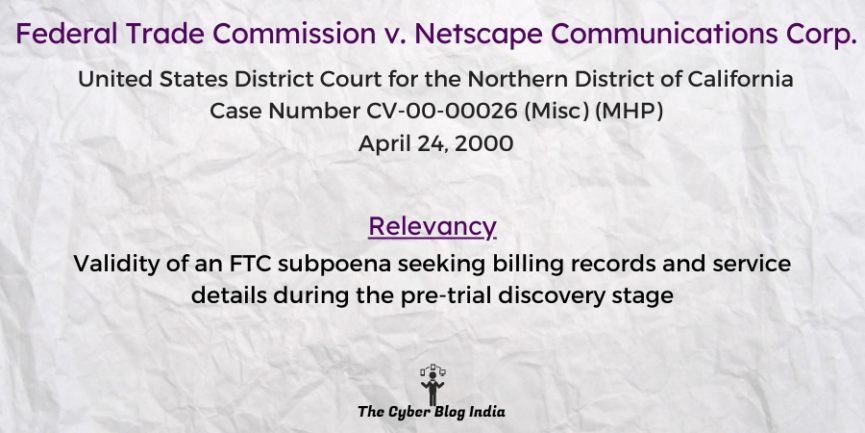Federal Trade Commission v. Netscape Communications Corp.

Federal Trade Commission v. Netscape Communications Corp.
196 F.R.D. 559
In the United States District Court for the Northern District of California
Case Number CV-00-00026 (Misc) (MHP)
Before Chief Judge Patel
Decided on April 24, 2000
Relevancy of the Case: Validity of an FTC subpoena seeking billing records and service details during the pre-trial discovery stage
Statutes and Provisions Involved
- The FTC Unfair Competition Statute, 15 USC § 45(a)
- The Electronic Communications Privacy Act, 18 USC § 2703
- The Federal Rules of Civil Procedure (Rule 45)
Relevant Facts of the Case
- In 1999, the FTC filed a civil case against the defendants for violating unfair competition laws.
- On November 01, 1999, during the pre-trial discovery in a separate case, the FTC subpoenaed Netscape for documents revealing personal information (such as names and addresses) linked to two specific email addresses. This subpoena required Netscape to provide billing records and service details.
- On November 10, 1999, Netscape’s counsel objected to the subpoena.
- In February 2000, the FTC filed a motion to compel Netscape to reveal the requested identity information regarding the two email addresses.
Prominent Arguments by the Counsels
- The plaintiff’s counsel:
- A trial subpoena in the ECPA includes all Rule 45 subpoenas, including discovery subpoenas. The counsel compared it to an administrative subpoena explicitly permitted in the statute, as both are broad and issued before the trial.
- This interpretation would not compromise subscriber privacy. Moreover, delaying information until trial may disrupt the proceedings.
- The respondent’s counsel:
- Under Rule 45, there is a clear distinction between discovery and trial subpoenas. The counsel highlighted the controlled nature of trial subpoenas and their specific focus on trial-worthy information compared to broader pre-trial discovery subpoenas.
- Congress deliberately excluded discovery subpoenas from the ECPA’s protection due to their broader scope and lack of judicial oversight. The inclusion of these subpoenas would undermine the ECPA’s privacy goals.
Opinion of the Bench
- Trial subpoenas under the ECPA solely pertain to trial subpoenas and not discovery ones. The court relied on objective differences outlined in Rule 45. Discovery subpoenas can compromise both the distinction and privacy protections of the ECPA.
- The plaintiff’s arguments are inconsistent with the legislative intent and privacy protections offered by the ECPA.
Final Decision
- The court denied the plaintiff’s motion.
